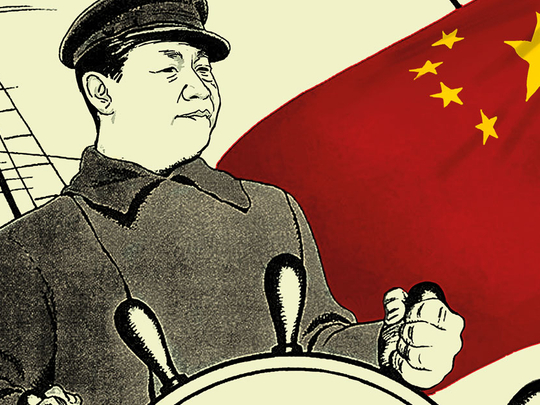
Yesterday, the Central Committee of the Chinese Communist Party met in its 19th congress and reelected a party leader who, more than any Chinese strongman since Mao Zedong, has attempted to reinvigorate the Communist ideology. Those in the West ignore Chinese President Xi Jinping’s pretensions at their peril.
For decades, many Americans dealing with and doing business in China have held to the idea that the Chinese Communist Party did not believe in anything other than power. There was no ideology in China other than money, the story went. “Pragmatic” became the buzzword used by reporters, academics and consultants for everything Chinese.
This blithe view of Chinese politics glossed over a struggle inside the party that began with the death of Chairman Mao in 1976 and ended — at least for the time being — with the Tiananmen Square crackdown of 1989. The faction that continued to favour a totalitarian ideology won. Those, such as one of Xi’s predecessors, Zhao Ziyang, who advocated the ultimate convergence of China with western liberal traditions, lost. Xi Jinping’s reelection as party boss constitutes a capstone of this struggle.
Xi’s ideology is a pastiche of imperial Chinese philosophy and radical western thought. While Xi represents a party that was once committed to doing away with the traditions of old China, he has embraced the idea of dynastic succession that lay at the heart of ancient Chinese politics. Xi hails from China’s red aristocracy. His father, Xi Zhongxun, was a founding father of China, close to Chairman Mao.
Xi Jinping’s accession to the top of the Communist party in 2012 constituted a victory for the families of the revolutionaries who conquered everything. In that way, the party’s propaganda ministries have positioned Xi — putting his face on buttons and plates and embracing him as “the core” of the party’s leadership — as the revolutionary inheritor of China’s first red emperor, Mao Zedong.
But Xi’s ideology is not simply Chinese, noted the Australian political analyst John Garnaut in a recent presentation. He has also recommitted China to the revolutionary philosophy of a man whom Mao hailed as his “great teacher”. That’s Joseph Stalin.
Xi has positioned himself as the defender of Stalin’s legacy. As he declared following the 18th Party Congress six years ago, which inaugurated his first term in office: “To dismiss the history of the Soviet Union and the Soviet Communist Party, to dismiss Lenin and Stalin, and to dismiss everything else is to engage in historic nihilism, and it confuses our thoughts and undermines the party’s organisations on all levels.”
Central to Stalin’s teaching is the idea that the creation of enemies is essential for sustaining the rule of a revolutionary party. Since taking power in 2012, Xi has found new enemies everywhere. He has launched the fiercest crackdown against dissent since the 1989 suppression of pro-democracy protests. Party members are urged to maintain vigilance against the plots of western liberal democracies who Xi has argued are dedicated to derailing China’s revolution.
Xi’s purification project has targeted corrupt officials and liberals alike, which to Xi are two sides of the same coin. Both are imbued with “the decadent culture of the capitalist class” as the state-run Guangming Daily put it recently.
Xi’s campaign against western freedoms was revealed in 2013 with the leaking of Document No 9. The document directed party officials to wage “intense struggle” to root out the “false trends” of western constitutional democracy, universal values of human rights, civil society, and the western concept of a free press among other evil weeds.
So, when people scratch their heads with wonder and why Xi and his police spend time, for example, worrying about five women who wanted to organise protests against groping on mass transit in China, the answer is not so much that it’s a sign of China’s fragility, as some would argue. It’s more — that the creation of an endless field of ideological villains is considered by Xi to be key to the party’s success. Crushing them and others like them give the revolution its meaning.
Another example of Xi’s totalitarian project involves his control of China’s internet. Over the past year, the party has put in place an Orwellian series of laws designed to ensure that no one can use the internet in China anonymously. In so doing, the party will aggregate, as two experts wrote, “all online data on individuals (financial transactions, behaviour, social network) to feed into a vast credit system”, which will play a part in accessing loans, education, travel and even such everyday activities as restaurant bookings. No wonder my Chinese friends are fans of Black Mirror the dystopian British sci-fi TV series about the use of technology to control our lives.
What does this mean for China’s relations with the United States and the rest of the world? It means that in Xi’s eyes, the West, and particularly the US, remains a necessary opponent. Without an America intent on overturning China’s one-party state, the Communist party loses its reason for being. This unrelenting logic makes impossible the dream of reassuring China. It also means that China will be tempted to export its social controls overseas.
In the autumn of 1971, on his second visit to China, Henry Kissinger — during meetings with Zhou Enlai to plan for the then US president Richard Nixon’s historic visit to China — mentioned a drumbeat of anti-American propaganda that had appeared in the Chinese press. Zhou assured Kissinger that it was not important. China’s state-run media, he said, was simply firing “empty cannons”. But attacking America does matter to the Communists; it was a centrepiece of their ideology. Almost five decades later, as Xi prepares to lead China for another six years, this remains the case.
— Washington Post
John Pomfret, a former Washington Post bureau chief in Beijing, is the author of The Beautiful Country and the Middle Kingdom: America and China, 1776 to the Present.









